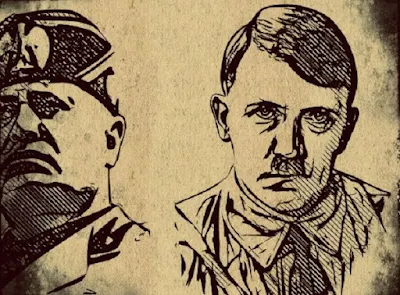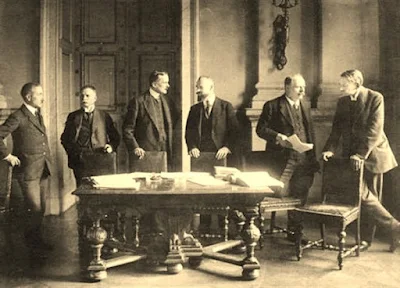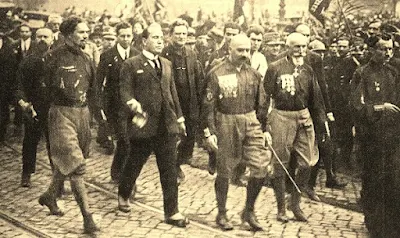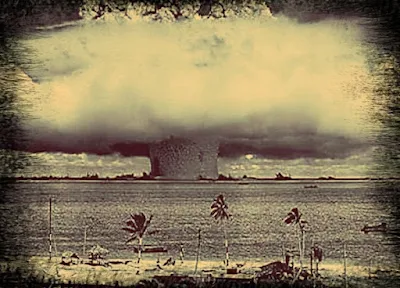World War II
- The Germans hoped for a just reconciliation after their defeat in World War I, but this peace (the Peace of Versailles)
- Germany lost 12.5% of its area, 12% of its population, about 15% of its agricultural production, 10% of its industry, and 74% of its iron ore production, and the area of the German coasts on the Baltic and North Seas shrank, and this reconciliation also stipulated to prevent the establishment of unity between Germany and Austria, which includes the largest group of Germans living outside Germany, and about two million Germans entered the borders of Poland, and about three and a half million Germans within the borders of the state of Czechoslovakia, which Established after World War I, these German minorities were the cause of instability, and imposed on Germany compensation estimated at six billion six hundred million pounds other than interest.
- The Treaty of Versailles limited the German army to no more than one hundred thousand, limited the ships of the German fleet, deprived it of the possession of the air force, and paid huge compensation to the Allies. In addition, it was decided that Germany would evacuate the areas on the right bank of the Rhine thirty miles wide from military forces, and France wanted to separate this area from Germany, and to establish an independent state there as a buffer between it and Germany, which was forced to abandon its overseas colonies.
- After all this, Germany became powerless, but France saw that Germany had not yet crashed, so it took place in (1923 AD) to occupy the German region of "Ruhr" rich in mines, and reasoned that this would force Germany to pay compensation.
The rise of Hitler and the Nazi regime
- These successive blows to the German economy caused political instability, and then these crises deepened in (1929 AD) when the world was exposed to a severe economic crisis that began in the United States, and moved from it to all countries of the world, but Germany was suffering more severely, as most of its factories stopped, and the number of unemployed exceeded six million workers, and the spirit of anxiety and discontent spread in the hearts of workers, and demonstrations came out raising red flags (which were expressing communism); Headed by Adolf Hitler, he was joined by veterans and many professional masters, and admired by Nazism, which advocated the unification of Germans in one state equal to the major powers, the abolition of humiliating peace treaties, and the exclusion of Jews and foreigners from economic and social life in Germany, and this party took the swastika badge as its symbol.
- The number of Nazis doubled during the economic crisis, Hitler's party won second place in the seats of the "Reichstag" (parliament) in (1930 AD), then Hitler received the most votes (24 million votes) in the elections (1932 AD), and assumed the position of chancellery (Prime Minister) in Germany in (January 1933 AD).
- No sooner had he taken office than he resolved to control the reins of government in the country, so he issued an order to dissolve the "Reichstag" and hold new elections, and began a process of terror against his enemies and opponents - especially the Communists -, and then announced that the Nazi National Socialist Party is the only legal party in the country, and then took over in (1934 AD) the presidency in Germany while retaining the position of chancellorship, and this was a prelude to the road to World War II.
Fascism in Italy
- Fascism arose in Italy in the conditions of the communist danger that threatened it, and Italy had joined the Allies during World War I to achieve colonial spoils in Africa, the Near East and the Adriatic coast, and lost in that war about (650) thousand soldiers, but the Allies treated it as a small partner when distributing the spoils, it did not win the peace except nine thousand square miles of land in Europe, and a million and a half in different directions, and Rome was not convinced of these gains, which aroused the resentment of the Italians.
- At the same time, an atmosphere of turmoil and instability prevailed in governance; successive ministries, unemployment spread and debts accumulated, and the majority of the people became inclined towards communism, then the extreme right led by "Mussolini" advanced to control the government, and led the march on Rome in (October 1922 AD), and was able to overthrow the government and compose the ministry, and since that date fascism began in Italy, and led a foreign expansionist policy, and demanded a reconsideration of the problem of reparations, and peace treaties.
The beginning of Hitler's rule
- With the Nazis led by Hitler to power in Germany, the balance of power in Europe was endangered, and Hitler's foreign policy aimed at the beginning to remove the shame of defeat and its consequences from Germany, in order to occupy the forefront among the nations, and settle its account with those who humiliated it - especially France -, and the German peoples are united and included in one state, and his steps to achieve this were to break the Treaty of Versailles, eliminate its provisions, and then extend German control over Europe, whether by peaceful means or war.
- So Hitler began to rearm Germany, so he announced in ( March 1935 ) the possession of the air force, and then concluded a naval agreement with Britain in the same year, in which he canceled the strict limitation of the German naval forces in exchange for his recognition of the superiority of the British naval forces, and Britain lenient him in the number and cargo of submarines that Germany can have, and thus he was able to separate Britain from the alliance established by France with the Soviet Union, as well as the number of the German army increased to (300) thousand fighters instead of (100) thousand, and then imposed Compulsory military service, and the establishment of a standing army in peace estimated at half a million soldiers.
- Hitler then proceeded to occupy the Rhine lands in March 1936, although the Peace of Versailles stipulated that it would be a demilitarized neutral zone to ensure the security of France. In the same period, Italy occupied Abyssinia, thus spoiling the relationship between Italy and the Allies, and this was the beginning of the formation of the "Axis" alliance, which was supported by the support of Hitler and Mussolini for the Franco Revolution in the Spanish Civil War with about eighty thousand soldiers.
The beginnings of the formation of the Axis
- The formation of the axis came because of the corruption of relations between Italy and both Britain and France; because of Italy's occupation of Abyssinia, in addition to other factors, including the ideological similarity between Nazism and fascism, and the need for the two countries to expand abroad to absorb the increase in population, and the Spanish War came to unite their efforts, and the word of the axis came in a speech by Mussolini in (November 1936 AD), and in the same month Italy, Japan and Germany signed a treaty against communism, and then evolved in (1939 AD) into a complete political and military alliance known as the "Rome-Berlin axis", and provides for the expansion of Italy in the Mediterranean and Germany's expansion in Central and Eastern Europe.
- Then a process of rapid international polarization began in that period between the two major camps (the Axis and the Allies); Japan, Hungary, Bulgaria, Romania, Slovakia and Croatia joined the Axis, while the Allies were led by Britain and France.
World War II
- Events developed, Hitler occupied Austria in (March 1938 AD) and merged it into Germany, which was known as the "Third Reich", then took control of Czechoslovakia the following year, and began to turn into swallowing Poland, and at the same time Italy invaded Albania, and Rome and Berlin signed a military pact stipulating that if one of the two countries got involved in war with another country or group of countries, the other country would rush to help it as an ally, and provide it with what it needed on land and sea, and in return there was a rapprochement ( French-British) is similar, and the British pledged to ensure Poland's independence.
- It is known that British Prime Minister Chamberlain did not stand decisively from Hitler's occupation of Czechoslovakia, and did not accept Soviet President Stalin's call for an international conference of major countries to ensure the protection of Central Europe and Eastern Europe, because Britain was afraid of the communist threat and its control over Europe, and when German ambitions intensified in Poland, the efforts of Britain and France did not succeed in convincing Poland of the passage of the Soviet army in its territory, and the Minister of Foreign Affairs of Poland said: "With the Germans we lose our independence, and with the Soviets we lose our soul" In front of this, the Soviet Union signed a non-aggression pact with Germany in August 1939, and this pact served as a green light for Germany to attack Poland.
- On (September 1, 1939 AD) the German forces were crossing the Polish border, and ignite the spark of World War II, and it became clear that Britain and France are the losers of the war, whatever its results, and the two countries were forced to give an ultimatum to Germany on the third day of its entry into Poland, and the war began to rage, and the German army was able to enter Denmark, Norway, the Netherlands, Belgium, France and the Balkans, but it failed to occupy Britain, after the terrible air battles between the Germans and the English, and German submarines failed to cut off the empire's transportation routes. British overseas, and Hitler made a big mistake when he turned to attack the Soviet Union in June 1941 AD, leaving Britain behind, a strategic base from which attacks could be directed at him.
Pearl Harbor port
- Meanwhile, the Japanese attacked the American Pacific Fleet at Pearl Harbor, sank many of its pieces, and then set off in Southeast Asia, becoming close to Australia, and until early (1942 AD) the Axis was still achieving victories everywhere.
Battle of El Alamein
- The West and the Allies were at their most collapse, and German forces penetrated North Africa towards the Middle East, trying to contact the Japanese in India, but were defeated in Egypt in the famous Battle of El Alamein.
- Before the end of (1942 AD), the picture had changed, as the Japanese fleet was defeated in the Battle of (Midaway), then the German commander Rommel was defeated in El Alamein, and after a few months the German forces were surrendering in Stalingrad in the Soviet Union, marking a turning point in the German-Soviet war, and the Allies began to invade Germany, where the Russians crossed the German border in December 1944 for the first time.
- The Allies continued to progress despite the valor of the Germans in defending their state and losing hundreds of thousands of deaths, and the heart of Germany became open, the Soviets and Americans flowed inside, as well as the Allies succeeded in entering Rome, then the Italian revolutionaries executed "Mussolini" and hung him from his feet in one of the lampposts in Milan, but Hitler committed suicide in (April 30, 1945 AD), and German representatives signed the surrender document unconditionally.
- As for Japan, the surrender document was signed unconditionally on September 2, 1945 AD after dropping two atomic bombs on Hiroshima and Nagasaki, and three days later the American flag was raised over Tokyo, and thus officially ended World War II after six years of fierce fighting, in which humanity lost about (17) million military personnel and many times this number of civilians.
How did ww2 affect Egypt?
Was Egypt in World War 2?
Why was Egypt important in ww2?
why did world war 2 start
when was world war 1
world war 2 summary
10 causes of world war 2
who won world war 2
when was world war 3
when did world war 2 end
world war 2 countries
why did world war 2 start
when was world war 1
world war 2 summary
10 causes of world war 2
who won world war 2
when was world war 3
when did world war 2 end
world war 2 countries










